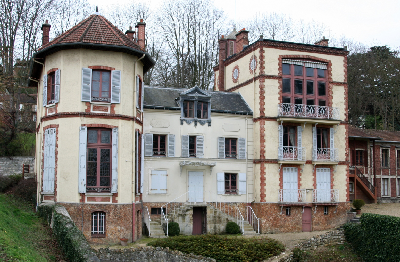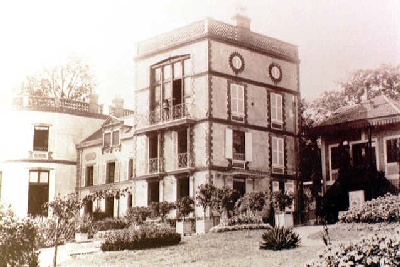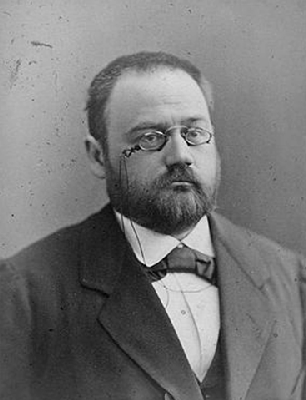Complete Works of Emile Zola (1767 page)
Read Complete Works of Emile Zola Online
Authors: Émile Zola

At this a cry escaped François, who hitherto had remained silent, and visibly anxious. ‘But I, Thérèse, I still love you!’ he exclaimed. ‘I love you as I never loved you before, and if you have suffered, I think that I now suffer even more than you have done!’
She turned towards him, and said very gently: ‘You speak the truth, I am willing to believe it.... It is quite possible that you still love, in spite of your folly, for amid all our craving for reason, our poor human hearts will ever remain a source of dementia. And as you suffer so much, there are two of us who suffer... dreadfully. But I cannot be your wife again if I no longer love you, if I no longer wish you for my husband. It would be unworthy of us both, our ill, in lieu of healing, would be poisoned by it. The best course for us to follow is to live as good neighbours, good friends, attending to our work, each free once more.’
‘But I, mamma!’ cried Rose, whose eyes were full of tears.
‘You, my darling? You will love us both to-morrow as you loved us yesterday.... And don’t be anxious, these are questions which one only understands when one is older than you are.’
With a caressing gesture Marc summoned the girl to him, and, having seated her on his knees, he was about to plead the cause of François once more when Thérèse hastily forestalled him.
‘No, no, grandfather, do not insist, I beg you. It is your tender heart, not your reason, that now wishes to speak. If you prevailed over me you might have cause to repent it. Let me be wise and strong.... I know very well that you wish to spare us suffering. Oh! let us confess that suffering will be eternal. It is in us, no doubt, for one of the unknown purposes of life. Our poor hearts will always bleed, we shall always rend them in hours of exasperated passion, in spite of all the health and all the good sense that we may succeed in acquiring. And, perhaps, that is the necessary good for happiness!’
A slight chilling quiver seemed to dim the bright sunlight; through all there passed a consciousness of the sorrowful grandeur of that recognition of suffering.
‘But what does it matter?’ Thérèse continued. ‘Have no fears, grandfather, we will be worthy and brave. It is nothing to suffer, it is only necessary that suffering should not make us blind and wicked. Nobody will know that we suffer, and we will even try to be the better for it, more gentle to others, more desirous of assuaging the causes of grief which exist in the world.... And, besides, grandfather, do not regret anything; say to yourself that you have done all you possibly could do, that you have carried out an admirable task which will give us all the happiness that reason can yield. As for the rest, as for sentimental life, each with his or her love will settle that according to personal circumstances, even if it be in tears. Leave us, François and me, leave us to live and suffer even, as we choose, for it only concerns ourselves. It is sufficient that you should have freed our minds, and made us conscious of a world of truth and justice.... And as you have brought us together hero, grandfather, it shall not be for the purpose of preventing a rupture, of which only François and myself can be the judges, but it shall be to give us an opportunity to acclaim you, to express to you our adoration, and our gratitude for your work!’
At this they all clapped hands, transported with delight, and the splendour of the sun seemed to have returned and to stream in a sheet of gold through the lofty windows. Yes, yes, this was the grandfather’s triumph in that very classroom where he had fought so bravely, where he had given the best of his heart and his mind to those who would become the people of the morrow. Children, grandchildren, great-grandchildren, all were his pupils, and all surrounded him as if he were a very venerable and powerful patriarch, from whom the happy future had sprung. He had kept Rose, who represented the last generation in its flower, on his lap; and she had twined her arms about his neck, and was covering his face with kisses. His daughter Louise, his son Clément had set themselves beside him with Joseph and Charlotte. And Sébastien and Sarah smiled at him and stretched out their clasped hands, while Thérèse and François, drawn nearer together, it seemed, by their affection for the august old man, seated themselves at his feet. At last Marc, deeply moved, almost stifled by the caresses heaped on him, said jestingly, with a pleasant laugh, ‘My children, my children, you must not make a god of me! You know very well that the churches are being shut up.... I am only a hard worker who has finished his day. Besides, I don’t want to triumph without my dear Geneviève beside me.’
He drew her near, taking her by the arm, and they all kissed her as they had kissed him, in such wise that the husband and wife, once parted, then reconciled and from that time commanding all possible happiness, were conjointly glorified in that elementary class-room, among those humble forms on which, again and again, the children’s children, all the generations going towards the happy city, would take their seats.
And that was Marc’s reward for all his years of courage and effort. He saw his work before him. Rome had lost the battle, France was saved from death, from the dust and ruin in which Catholic nations disappear, one after the other. She had been rid of the clerical faction which had chosen her territory as its battlefield, ravaging her fields, poisoning her people, striving to create darkness in order to dominate the world once more. She was no longer threatened with burial beneath the ashes of a dead religion; she had again become her own mistress; she could go forward to her destiny as a liberating and justice-dealing power. And if she had conquered it was solely by the means of that primary education which had extracted the humble, the lowly ones of her country districts, from the ignorance of slaves, from the deadly imbecility in which Roman Catholicism had maintained them for centuries. Some had dared to say, ‘Happy the poor in spirit!’ and from that mortal error had sprung the misery of two thousand years. The legend of the benefits of ignorance now appeared like a prolonged social crime. Poverty, dirt, superstition, falsehood, tyranny, woman exploited and held in contempt, man stupefied and mastered, every physical and every moral ill, were the fruits of that ignorance which had been fostered intentionally, which had served as a system of state politics and religious police. Knowledge alone would slay mendacious dogmas, disperse those who traded and lived on them, and become the source of wealth, whether in respect to the harvests of the soil or the general florescence of the human mind. No I happiness had never had its abode in ignorance; it lay in knowledge, which will change the frightful field of material and moral wretchedness into a vast and fruitful expanse, whose wealth from year to year culture will increase tenfold.
Thus Marc, laden with years and glory, had enjoyed the great reward of living long enough to see his work’s result. Justice resides in truth alone, and there is no happiness apart from justice. And after the creation of families, after the foundation of the cities of just work, the nation itself was constituted on the day when, by decreeing integral education for all its citizens, it showed itself capable of practising truth and equity.
THE END
The Short Stories

Zola’s home at Médan, which he bought in 1878 following the publishing success of ‘L'Assommoir’. The author lived in this house for 24 years, where he often invited friends to literary gatherings, until his death in 1902.

The house in Zola’s time
STORIES FOR NINON

Translated by Edward Vizetelly
Published while working as a lesser known clerk at Hachette in 1864, the short story collection
Contes à Ninon
is Zola’s first book. The short stories were mostly written in 1859, several appearing in the periodical
La Revue du Mois
, printed by Géry Legrand, a collaborator Zola had met while working on the Lille press. The collection contains a mixture of stories highly Romantic in tone, much in the style of Victor Hugo, who was Zola’s main source of inspiration at this time.
The print run for
Contes à Ninon
was 1,500 copies and, although the collection was only a modest success, it provided the twenty-year-old writer with new literary connections, allowing him to write over a hundred new articles in the press during the next three months.
By January 1866, Zola felt confident enough to resign from working at Hachette to live by his pen. The publisher was keen to part with Zola, following the scandal caused by the publication of his first novel
Claude’s Confession
, which had occasioned an investigation by a Public Prosecutor.

Zola, close to the time of publishing his first book
CONTENTS
THE ADVENTURES OF BIG SIDOINE AND LITTLE MÉDÉRIC
TO NINON
Here they are then, my friend, these unfettered narratives of our young days, which I related to you out in the country in my dear Provence, and to which you listened with an attentive ear, whilst vaguely following with your eyes the great blue lines of the distant hills.
On May evenings, at the moment when heaven and earth glide slowly into supreme peace, I left the city and reached the fields; the barren slopes, covered with brambles and juniper bushes; or else the banks of the little river, that December torrent, so unobtrusive in fine weather; or again an out-of-the-way corner of the plain, warm with the embrace of the south, a broad stretch of red and yellow land, planted with almond trees with slender branches, old olives turning grey, and vines with their entangled offshoots trailing along the ground.
Poor parched earth, it stands out glaring, grey, and naked in the sun, between the fertile meadows of the Durance and the orange groves on the sea-shore. I love it for its harsh beauty, its doleful-looking rocks, its thyme and lavender. There is, I know not what burning air of desolation about this sterile valley; a strange whirlwind of passion seems to have passed over the country; then, great oppression followed, and the fields, which were still full of generous warmth, fell asleep, so to say, in a final desire. At present, amidst my forests of the north, when I recall to mind that stone and dust, I feel most profound love for that rugged country which is not mine. Doubtless the merry child and the sad old rocks formerly felt tender affection for each other; and now the child, who has become a man, disdains damp fields and submerged verdure; he is in love with the broad white roads and calcinated mountains, where his mind, in all the freshness of its fifteen summers, dreamed its first dreams.
